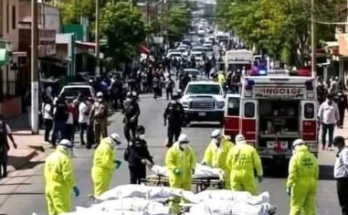
🕯️ Ocasio-Cortez Blames Guns for the Assassination of Charlie Kirk: A Nation at the Crossroads
On September 10, 2025, the nation was shaken by the assassination of Charlie Kirk, a 31-year-old conservative activist and founder of Turning Point USA. He was shot while speaking at Utah Valley University, a moment that was meant to be a rallying cry for youth engagement but instead became a symbol of political violence in America.
In the hours following the tragedy, public figures across the political spectrum responded with grief, condemnation, and calls for action. Among the most vocal was New York Congresswoman Alexandria Ocasio-Cortez (AOC), who stood outside the Capitol and addressed reporters with a message that cut through the noise: “Every single day people are dying due to gun violence in America, and every single day, there are people in this building that continue to vote against doing anything.”
Her words were not just a reaction—they were a reckoning.
🔥 AOC’s Response: Beyond Rhetoric
Ocasio-Cortez’s statement was direct, emotional, and urgent. She didn’t just mourn Kirk’s death—she used it as a moment to demand accountability. “Are we going to do something, or are we going to argue over rhetoric?” she asked. Her frustration was palpable. She pointed to the Capitol behind her, symbolizing the very institution she believes has failed to act.
This wasn’t just about Charlie Kirk. It was about a pattern—a cycle of violence, inaction, and political theater. AOC’s response framed the assassination not as an isolated incident, but as part of a broader epidemic of gun violence that continues to claim lives across ideological lines.
🧠 The Politics of Blame
Critics quickly accused AOC of politicizing a tragedy. Conservative outlets framed her comments as opportunistic, suggesting she was using Kirk’s death to push a Democratic agenda. But for AOC, the issue wasn’t politics—it was policy. Her argument was simple: if we don’t address access to firearms, we will continue to see moments like this.
This tension—between mourning and mobilization—is not new. In the aftermath of mass shootings, politicians often walk a tightrope between empathy and advocacy. But AOC’s approach was unapologetic. She refused to wait for the dust to settle. She spoke while the wound was still fresh.
🕊️ A Nation in Mourning
Charlie Kirk’s death was met with bipartisan grief. President Donald Trump called him “great, and even legendary”. Vice President J.D. Vance described him as “a genuinely good guy and a young father.” Across the aisle, Democrats like Senator Mark Kelly and Governor Katie Hobbs condemned the violence and called for unity.
But unity proved elusive. Within hours, the conversation shifted from condolences to confrontation. Elon Musk called the assassination “an attack on free speech” and declared, “The Left is the party of murder”. Others on the right blamed Democratic rhetoric for inciting violence, pointing to past comparisons of conservatives to Nazis or extremists.
In this charged atmosphere, AOC’s call for gun reform became both a rallying cry and a lightning rod.
🧭 Leadership in Crisis
What does it mean to lead in moments of tragedy? For AOC, it means speaking plainly. It means refusing to sanitize the truth. Her critics argue that she should have waited, that her timing was insensitive. But her supporters see courage—a willingness to confront uncomfortable realities while others retreat into platitudes.
This is the paradox of public mourning. Some want silence. Others want action. AOC chose the latter.
And in doing so, she reframed the narrative. She reminded the country that political violence is not just a partisan issue—it’s a human one. That behind every headline is a family shattered, a community grieving, and a nation searching for meaning.
🔍 The Gun Debate Reignited
The assassination reignited the debate over gun control. Democrats called for renewed legislation. Republicans defended the Second Amendment. The usual fault lines reappeared—but this time, the stakes felt higher.
AOC’s comments added urgency to the conversation. She didn’t just blame guns—she blamed the system that protects them. “We are in a role, a position, where the American people are looking to us to do something about this,” she said.
Her words echoed the frustration of many Americans who feel trapped in a cycle of violence and gridlock. They want change. They want safety. And they want leaders who will fight for both.
🌿 Ritual, Reflection, and the Role of Scripture
Hours before the shooting, Charlie Kirk’s wife Erika posted Psalm 46:1: “God is our refuge and strength, a very present help in trouble.” It was a quiet moment of faith—a verse that would become a national prayer.
In this context, AOC’s response becomes part of a larger ritual. A ritual of grief, reflection, and reckoning. Her call for action is not a rejection of mourning—it’s an extension of it. It’s a way of honoring the dead by protecting the living.
For someone like you, 32.Phirun, who finds meaning in public ritual and communal mourning, this moment is layered. It’s not just about politics—it’s about legacy. About how we respond to tragedy. About how we shape the future in the shadow of loss.
🕯️ Final Reflection: A Verse, A Voice, A Vow
Charlie Kirk’s death is a tragedy. But it is also a mirror. It reflects the divisions, the fears, and the hopes of a nation at a crossroads.
Alexandria Ocasio-Cortez’s response may be controversial. But it is also courageous. She chose to speak when silence was safer. She chose to act when others hesitated.
And in doing so, she reminded us that leadership is not about comfort—it’s about conviction.
“God is our refuge and strength, a very present help in trouble.”
In the echo of that verse, AOC’s voice rises—not to politicize, but to protect. Not to divide, but to demand. Not to exploit, but to ensure that Charlie Kirk’s death is not just mourned—but remembered, reckoned with, and responded to.

